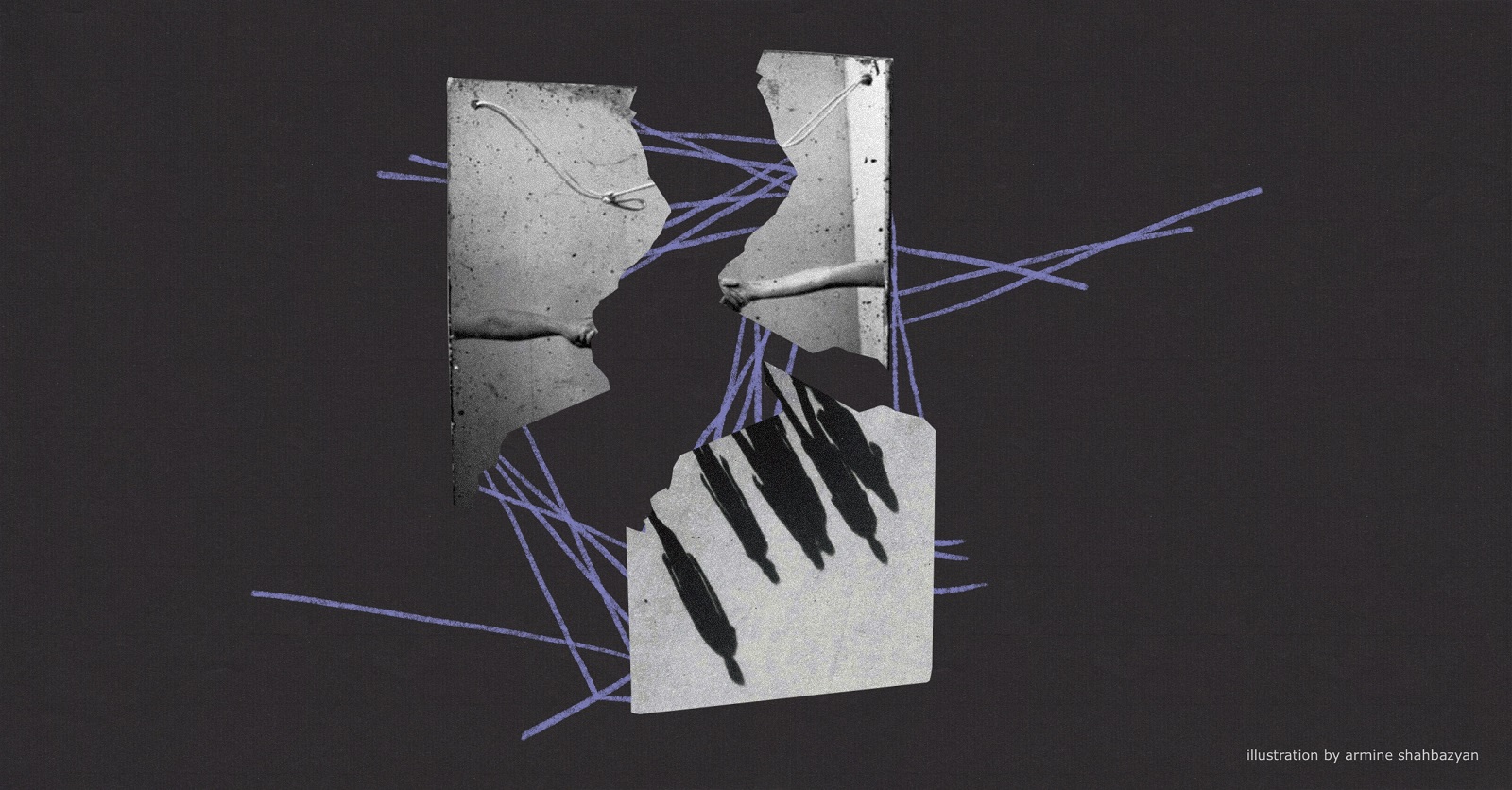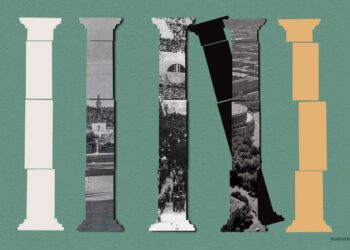
Listen to the article.
In one extraordinary incident three years ago, a group of senior military officers released a statement demanding the government’s resignation. The group, including Armenia’s highest ranking military officer, released the statement following Prime Minister Nikol Pashinyan’s public criticism of Russian missile systems in the wake of the 2020 Karabakh War, but more specifically, the firing of the deputy chief of staff of the Armed Forces a day earlier. This move was a potentially fatal blow to a struggling democracy such as Armenia, but the current administration prevailed, though dissatisfaction with the government’s performance lingered on.
Since 2020, discontent has permeated different layers of society, reflecting a legitimate response to the uncertainty caused by Azerbaijan’s seemingly insatiable expansionism. This expansionism is driven by Aliyev’s revanchist policies (Western Azerbaijan) and aggressive militarism (increased arms imports). This simmering dissatisfaction is most recently characterized by vociferous opposition to the April 19 agreement to delimit a section of the Armenia-Azerbaijan border in Tavush region. However, what initially began as a spontaneous occupation of local roads led by villagers demanding government transparency and concrete security guarantees has morphed into an attempt at regime change led by a conglomeration of ex-diplomats, clergymen, and politicians affiliated with the former regime. Punctuated by a nationalist-patriotic discourse, this new challenge to Armenian democracy has obfuscated both class and ideology from the conversation.
Wolves Dressed as Lambs
What sets this movement apart from previous protests is the active endorsement and involvement of the Church in an effort to upend the Pashinyan administration. The involvement of clergymen in the Tavush movement presents a conundrum for Armenian society not in its revival of the debate regarding the Church’s roles in politics, but in the way in which certain ruling class forces are exercising unity behind its figurehead, Bagrat Galstanyan. The now former archbishop of the Tavush Diocese, Galstanyan has operated with the approval of both Echmiadzin and numerous political actors (including diasporan organizations), and recently announced his candidacy for prime minister. Lacking the bonafides and legal qualifications to even be eligible for political candidacy, Galstanyan has propelled himself into the spotlight by initially joining the protests in the village of Kirants, deflecting questions about his motivations, and perhaps most importantly, his benefactors. Between the clergymen, “activist-reporters”, and nationalist academics, you have a sanctified cocktail of reactionary, right-wing politics: disinformation, utter contempt for democracy, and obscurantism.
Red flags notwithstanding, the least the public could expect from an opposition figure is transparency. For someone as insistent in presenting themself as representative of the truth, the details regarding Bagrat Galstanyan’s background are muddled at best. We know his tenure as primate in Canada ended abruptly, and was mired in controversy. In one incredible scene among many in the month since protests began, Galstanyan falsely accused the deputy rector of Yerevan State University of preparing lists to repress students before being confronted by the rector herself in front of cameras. What is clear is the support (spiritual, or material) Bagrat Galstanyan is receiving from the Church leadership, who in turn have much to answer for. Notably, the Church enjoys warm relations with Russia, whose soldiers stood idly by as Armenians in Artsakh were subject to a months-long blockade prior to their forced removal. Coupled with the deafening silence of the Church leadership in response to the shootings of protesters in 2008, begs the question: why speak out now?
The People’s Stick
These coalescing forces are attempting to fill the political vacuum created in a two-part process following the 2018 Velvet Revolution. Firstly, the leading characters of the movement were subsumed into government activity. Civil Contract Party members won the majority in the National Assembly and most notably, the top job of the executive branch. The radical street politics which characterized the ethos of 2018 was funneled into the bureaucratic processes of the State (where revolutions tend to whither and die). Outside of the government, no alternative emerged to continue to push for a social revolution and transform society. This is largely due to the disastrous consequences of the second factor, the 2020 war in Karabakh, which effectively halted the social progress people had been diligently striving for. When even the most progressive elements of Armenian society fall in line with nationalist-patriotic discourse under threat of social ostracization, alienation, and physical violence, there is little chance for a progressive, independent alternative to develop.
The dominant force left to defend the merits of the so-called revolution is the State. This presents a serious challenge to the entire political system — vesting the legitimacy of its power in the State — which in turn will resort to unpopular methods to ensure its survival. In practice, this could mean an enforced privatization of public services and deep measures of austerity. For its part, the Pashinyan administration has largely expanded the repressive capabilities of the police under the guise of reforms, taking their cues from global leaders in policing. What countries get wrong in their insistence to reform the police is their failure to acknowledge the real function of police — to enforce the social order. Police brutalizing protesters is no exception in their repertoire of action; it is in fact a hallmark of it! When confronted with disruptive right-wing hooliganism — which largely characterizes this movement — it is unsurprising that instances of excessive force occur. Perhaps there is a sense of content among those who suffered the violence of water cannons and batons prior to the Velvet Revolution. But this abdication of social responsibility — leaving the State to be the defender of the politics of the revolution — is a dangerous precedent to set.
Against Unity
These processes lay bare the consequences of a political culture which emphasizes elevating leaders into positions of power, instead of revolutionizing society itself through strong movements independent of political parties or traditional-cultural organizations. Under these circumstances, people absolve themselves of their social responsibility, and leave politics to the corridors of power. With no democratic or progressive opposition to challenge an increasingly inert ruling party, or stave off the machinations of a bitter ex-regime and its allies; independent movements risk being hijacked. Thus, the ill-defined nation becomes the focal point of the body-politic, confining political imagination to the rigid boundaries of a nationalist discourse vulnerable to stagnation, and easy on the ears to a population still reeling from the ethnic cleansing of the Armenians of Artsakh, and the omnipresent threat of an Azerbaijani invasion.
Subsequently, anytime a social and political fissure appears, a gaggle of opportunists can waltz in and seize the moment regardless of a murky background, class affiliation, or ties to authoritarians. A chance for a political movement independent of the government, political parties, and other traditional-cultural organizations thus gets swallowed into the mire. This mutation misleadingly proclaims itself as apolitical, then upon arrival in the capital immediately demands the government’s resignation. Throngs of microphone-ready reporters and camera operators hurdle around their leaders, and the original demands of the people bold enough to initially take action are drowned out. The personal schemes of officials affiliated with the previous regime are therefore imposed onto a movement whose leadership (including those behind the scenes) are divorced entirely from the realities of the lives of the people they claim to represent.
Analysts and commentators are missing the forest for the trees; lamenting the deep divisions fracturing Armenian society, and viewing the moment as an opportunity to unite the nation. This liberal interpretation of the situation fails to account for the very real dangers Armenian society faces if these reactionary forces continue to gather strength. We should listen to the Tavush Movement’s leaders when they tell us who they are. Our Georgian companions to the north can testify to the hazards presented by an unchecked oligarchy who legitimately acquired power through subterfuge. Instead, we should turn to methods largely ignored by both the State and the Tavush Movement: building an independent, democratic power capable of countering the seductive allure of narrow patriotism, which collapses the diverse variations of Armenian identity into one amorphous shape. In short, an opposition worthy of the name!
Also see
The Challenge of a Sacred Union
Archbishop Bagrat Galstanyan, leader of the "Tavush for the Homeland" movement, is advocating for resistance against the government's peace policy. Blending patriotism, spirituality and disobedience, his aim is to restore national morale. But can he succeed? Tigran Yegavian’s analysis.
Read moreOpinion
Genocide 2.0: Old Threats, New Delivery?
Davit Khachatryan focuses on the changing dynamics surrounding genocide, particularly in light of modern warfare tactics and weaponry, emphasizing the importance for Armenia to be vigilant in response to emerging threats.
Read moreOrphan to Internationalist: The Legacy of Missak Manouchian
Missak and Melinee Manouchian made history as the first foreigners to be inducted in the French Pantheon for their role in the fight against Nazism. The pantheonization sparked a wave of romanticism, glossing over the complexities surrounding foreign participation and the ensuing quest for recognition.
Read moreIs Armenia a Nation-State?
Is Armenia a nation-state? While the answer may seem obvious at first glance, upon closer examination, the question's significance becomes apparent, writes Tigran Yegavian.
Read moreBeyond the Drone Hype: Unpacking Nagorno-Karabakh’s Real Lessons
The 2020 Artsakh War served as a stark reminder of the transformative role that drones are playing on the modern battlefield. Davit Khachatryan argues, however, that the overemphasis surrounding drones requires a more sober and critical analysis.
Read more





